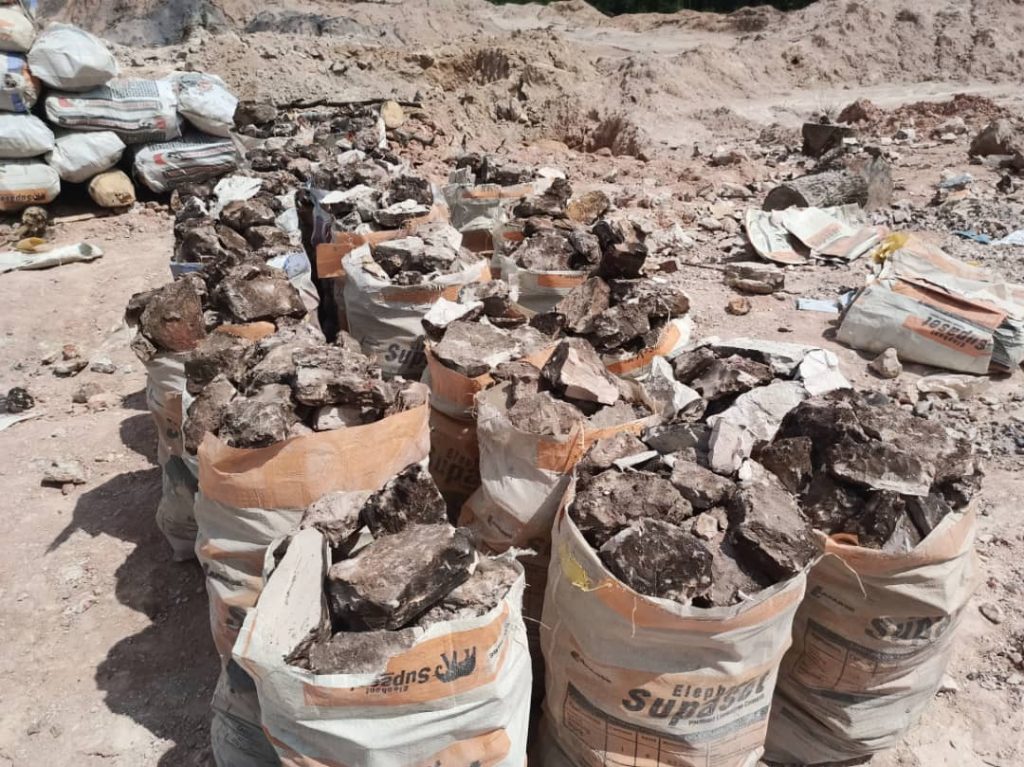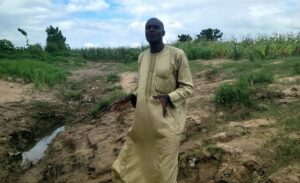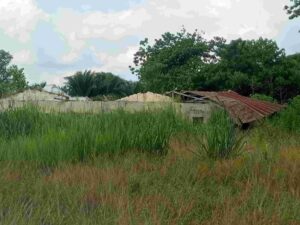In this report, Stephen Ukandu beams his searchlight on the mining of kaolin, a mineral deposit found in large quantities in Umuahia, Abia State; but lifted to other states for industrial use due to lack of leadership foresight thereby lowering its value chain.
Video Player
Kaolin is among the mineral resources which nature endowed Abia State with.
Kaolin is a soft fine clay, rich in kaolinite and serves as raw material for ceramics, paper-making, and in manufacturing of other products.
According to Wikipedia, Kaolinite is a clay mineral, with the chemical composition Al₂Si₂O₅(OH)₄. It is a layered silicate mineral, with one tetrahedral sheet of silica linked through oxygen atoms to one octahedral sheet of alumina.
In Encyclopedia Britannica, Kaolin is defined as “soft white clay that is an essential ingredient in the manufacture of porcelain, and is widely used in the making of paper, rubber, paint, and many other products.” Kaolin is named after the hill in China (Kao-ling) from which it was mined for centuries.
From historical perspective, “samples of kaolin were first sent to Europe by a French Jesuit missionary around 1700 as examples of the materials used by the Chinese in the manufacture of porcelain,” it added.
Meanwhile, Kaolin as found in nature usually contains varying amounts of other minerals such as muscovite, quartz, feldspar, and anatase.
Kaolin has been mined in France, England, Germany, Czech Republic, and in the United States, where the best-known deposits are in the South Eastern states. But our investigation revealed that mining of kaolin began in Umuahia in the 1900s.
Notably, Kaolin is used extensively in the ceramic industry, “where its high fusion temperature and white burning characteristics make it particularly suitable for the manufacture of whiteware (china), porcelain, and refractories,” Encyclopedia Britannica added.
“Kaolin is also used as an extender and flattening agent in paints. It is frequently used in adhesives for paper to control the penetration into the paper.
“Kaolin is an important ingredient in ink, organic plastics, some cosmetics, and many other products where its very fine particle size, whiteness, chemical inertness, and absorption properties give it particular value,” it concluded.

Corroborating this, the Head, Department of Geology, Michael Okpara University of Agriculture Umudike, MOUAU, Dr Amos Uhuegbu (an Associate Professor), told Ikengaonline that kaolin is also medicinal and used for pharmaceutical purposes.
“Mist Mag (Antacid) and Calamine Lotion are made of kaolin,” Dr Uhuegbu said. Former Dean, College of Veterinary Medicine, Professor Madubuike Ezeibe who was said to have found a HIV/AIDS ‘therapy’ concurred when he said that kaolin was the raw material he used in formulating the therapy which has proved effective also in the treatment of COVID-19 virus.
Dr Uhuegbu further affirmed that kaolin is one of the essential raw materials for the manufacturing of paints, adding that it has its good use in the ceramics industry.
“In those days when we had grandmothers who were into pottery, they used kaolin,” the Associate Professor added.
He further explained that if subjected to higher temperature and pressure, kaolin could also be used to produce tiles and marbles.
“When you subject kaolin to a very high temperature, you even get things like marble but it has to undergo some chemical alterations for you to get what you want.”
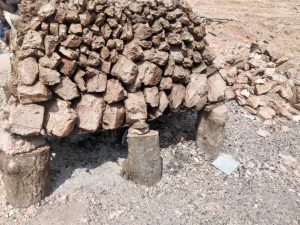
There are about three types of kaolin – kaolinite, allophane, and halloysite, but the commonest type is the kaolinite.
When kaolin is being mined or dug up, it is soft like wet clay and it is usually dried or smoked to remove the water content.
In Umuahia, communities with large deposits of Kaolin include: Ogbodiukwu, Umuogo Ubakala, Amibo and Ohiyya Autonomous communities all located on the Enugu-Port Harcourt Expressway. There could be deposits of this mineral in other communities but for now, mining has not commenced outside the above four.
When Ikengaonline visited Ohiyya Community, a suburb of Umuahia, it was gathered that merchants in the kaolin business buy or lease land rich with the mineral deposit from the owners. After exploitation, the owners reclaim their land depending on their terms of agreement.
But some community sources who pleaded anonymity for fear of persecution, accused the merchants of exploiting the owners of the land. According to the sources, the merchants only give peanuts to the landowners while they make great fortunes from the mining.
Some of the sources said: “Yes we have kaolin here but it’s owned and mined by individuals. Some of our people in the business are ready to do anything against anybody trying to stop them.
“They are the ones enjoying the benefits of this mineral deposit, and if you are not strong and somehow try to come in their way, they take you down.
“They buy or lease land from the owners and based on what they negotiated, they mine for years and the owner reclaims his land at the end of mining activities there.”
The sources, however, regretted that “the land becomes useless” after mining activity had taken place in it especially if left uncovered.
“After mining, the land becomes useless to the owner and community. The worst is that the land owner is not even paid enough by the merchants to hire labourers to cover the pit after mining.”
According to multiple local sources, mining of kaolin in commercial quality in Umuahia began in the early 1900s.
From the sources it was also gathered that kaolin could still form in a particular pit after about 10 years provided it was covered with earth after the first mining.
This confirms an earlier submission by Associate Professor Uhuegbu who said that kaolin is a product of weathering processes.
From the local sources, it was gathered that kaolin is supplied to a ceramic industry based in Kogi State while another type of the mineral (usually the rare type) is shipped abroad.
“There is a company in Kogi State buying kaolin from them but the main one is shipped abroad to different countries including Cameroon, Garbon and China,” said a local source.
According to local sources who still did not want to be named for fear of persecution, some of the miners are recruited from outside including neighbouring Akwa Ibom State.
When Ikengaonline visited one of the mining sites in Ohiyya Community, a lot of workers were seen engaged in different mining activities.
Our Correspondent was however, not allowed access to any of the workers as somebody who claimed to be the site Manager said the owner of the site was not available, adding that they did not want any media exposure. When contacted later, the said owner claimed he was not available.
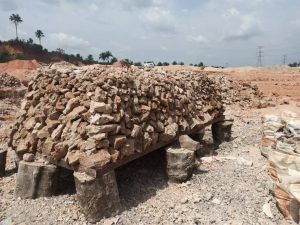
But owners of another site at Umuogo Ubakala Autonomous Community were more receptive and friendly when our Correspondent visited the site.
The regent of the community, Chief Luke Nzenwa, also confirmed that kaolin merchants buy or lease land from the owners and begin exploration after settling the owners depending on their terms of agreement.
He, however, said negotiations were still on on what the community should be getting from the exploitation although he admitted that one of the merchants, “a son of the soil,” had been into a lot of charitable works and had socially been responsible.
“One of our sons is into the business and he has been good to us. He grades our community road during Christmas, sinks water boreholes and engages in some other development works,” the regent said.
He, however, said that siting a ceramic industry in the area would be more beneficial to the people as it would create more job opportunities for the youths.
“As a community, we want Government to build a ceramic industry in our land so that our children will get meaningful jobs. Some youths are into hard drugs because they are idle.”
Later in an interview, Prince Ndubuisi, Manager of one of the companies operating in the community, said they had been into mining of kaolin in the area for 14 years.
He confirmed that the miners buy or lease land from the landowners for mining, and return them to the owners when they are done.
“Yes, we lease the land from the owners and afterwards they reclaim it. Some of them sell to us outrightly,” he said.
“We ensure that we do the things that we agreed. We settle the individuals that own the land, and we also settle the community including the youths.
“We equally assist in checking erosion in the community; and we employ youths from the community who we pay manageable wages.”
The Manager who is the son of the owner of the mining company further admitted they were into partnership with West African Ceramic based in Kogi State where majority of the mineral deposit are taken to for industrial use.
According to him between 20 – 30 truck loads of kaolin are lifted from the site to Kogi State every month.
“We mine more of ball clay and pink clay in this site which are used for production of different types of tiles. We take them to Kogi State where about other types of stones are added to them to produce tiles. It is also used in production of water closet (WC) as well as paints.
“The main kaolin is smoked/dried and shipped outside Nigeria. It’s mainly for pharmaceutical purposes. That one is more costly.”
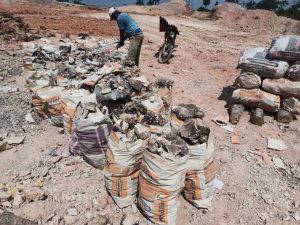
Cost of establishing ceramics industry:
Responding to Inquiry, the Manager narrated how the owner brought in West African Ceramic Industry which made unsuccessful attempts to take over and revive the moribund Modern Ceramics Industry Umuahia. His attempts to set up a brand new modular ceramic industry in the area was also unsuccessful due to the high cost implications.
“Initially, our partners, West African Ceramic wanted to acquire Modern Ceramics Umuahia but the price quoted by the owners of the company was too high and they left. They said that building new one is better because it’s only the land and the building that are still useful – all the equipment there are now obsolete.
“We have also reached out to some of our brothers to see if we can pull resources to set up a new ceramic industry but the capital involved is on the high side. Our people are reluctant to invest in a business they don’t have sufficient knowledge about. So, insufficient capital has been our major challenge. “
Corroborating this, another top Management staff of the company, Mr Obinna Orji, said the high exchange rate of the dollar to naira had frustrated efforts to establish a modular ceramic industry in the state.
“In 2021 when the owner of this company wanted to set up a modular ceramic industry here, one of the key machines needed, sold for N28 million then when Naira was exchanging for about N400 per dollar but now a dollar is over N1000 Naira.
“You need between N500 million – N700 million to successfully set up a modular ceramic industry now. And our people do not want to invest in a business which they do not know much about. So, for you to get others to join you, you have to begin first, and we need about 70% of this money which is not easy to come by.
Burden of over taxation:
The company bitterly complained of over taxation by government, alleging that the State Government is rather frustrating its efforts with excess tax.
“Government is our major problem here. They want to kill us with over taxation. If you look around you will see that we have only few equipment here but Government is only after tax and not how it can assist us. We have our mining license and pay royalty to the Federal Government but the State Government will tell you: ‘You are mining in their land, and have to do something.’ The Local Government will also come, and then the community. You will still pay your workers and at the end of the day, you will be left with little.
“In 2021, the previous administration in the state, came and sealed this place for two weeks. They said we should pay N4.7 million. We had to go and raise money to pay.”
When contacted, the Chairman, Abia State Board of Internal Revenue, BIR, Professor Udochukwu Ogbonna, said the new administration would not engage in over taxation or any unprofessional conduct, assuring that investors in the state would be handled in a most professional way.
He, however, said that over-taxation is relative, arguing that long period of tax holiday had made some business owners in the state think that they are being over taxed. The BIR boss, promised that the new administration would related well with all business owners in the state.
Lack of access to Government grants, and the soaring cost of energy were equally identified as one of the challenges of kaolin miners in Abia.
“Another major challenge we face here is the high cost of diesel. Before you can conduct a soil test to help you know where you can find the mineral deposit, you spend about 240
liters of diesel. Some times you do a test for five days, and if you are unsuccessful, that money is gone.
“Government is not helping us. When they want to ‘move money,’ you will here that they have given so, and so amount to miners. It’s more like audio money; miners in the South-East don’t benefit from such loans. People at the top hijack it.
“In 2015, the World Bank released money for miners to purchase equipment. We were asked to go and get market prices of the materials we needed and submit the details of the suppliers to the Bank of Industry. We did all those things but after the struggles for two years, they asked us to come and collect N10 million where as we needed N120 million – N200 million.
“So, we decided to leave everything. Most of the people favoured were those from the North. Names of people who were not even miners were submitted, and they collected the loan for different purposes. Since then, we lost interest in Government loan because even the money and time you waste travelling to Abuja for meetings were so enormous. If Government really wants to assist us, they should help us get new machines because it’s more efficient, and the fuel consumption is more economical.
“Ordinary fairly-used Escalator now is about N40 million. A brand new one goes for about N120 million. We spent about N1 million in servicing our equipment every month.”
Mining of kaolin not properly coordinated – Commissioner
Commissioner for Petroleum and Solid Minerals, Mr Joel Ogbonna, when contacted, said that there was no proper coordination of mining of mineral resources in the state.
“Abia is blessed with a number of minerals but the mining is not well coordinated because there has not been a remarkable large scale investment. The new Government will give it a priority. By next year we’ll go into a well coordinated mining activity. It’s part of our high level drive for next year. The Governor is well committed and we’ll make sure we take advantage of what is available to us.”
On the complaints of over taxation by some of the miners, the Commissioner said the state was not even getting what was due to it.
“They are not being over-burdened with tax. They have obligation both to the state and the Federal Government. They have a commitment to the state even though their royalty is to be paid to the Federal Government. We are not getting what we are supposed to get because there has not been well coordinated efforts. They have been evading some of these responsibilities. Government in the past, hasn’t been really focused.”
On the environmental impacts of their activities, the Commissioner said environmental impact assessment has not been done; but that Government would guide the miners to observe due diligence.
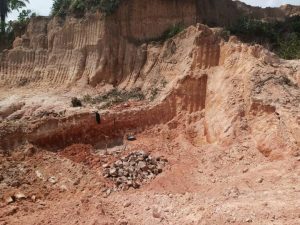
Wrong use of land with mineral deposits for housing estate:
The miners also complained that the State Government was acquiring land with mineral deposit for housing estate, describing it as unnecessary waste.
“Another challenge that we have here is that Government is busy acquiring lands around this mining site for housing estate. This is wrong because it amounts to waste. The raw materials according to the 1999 Constitution have to be removed first before buildings can be erected on the land.
“But here Government is allocating the land for housing estates, and mining is not what you do for few years; it takes some time. This area should have been left for farming and mining because the value of the mineral is far greater than ordinary structures.”
Safety on site
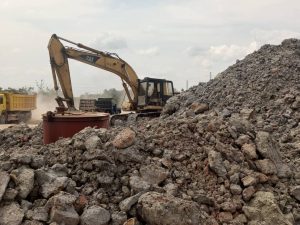
The company said they had put it place safety measures to prevent disaster such as pit collapse and other mishaps in the site.
“We have not witnessed accidents here because we conduct mining in a way that avoids the risk of pit collapse. We use Escalator to remove the surface soil and create reliable space for miners, and they can stay inside the pit for as long as they can without any fear. Since, we started mining here about 14 years ago, we have not had incident of any accident, and we don’t expect it although we have measures for quick response.”
Some of the workers at the site told Ikengaonline that they were happy mining at the site, saying that it enables them take care of their basic needs.
One of them who simply introduced himself as Peter, said he makes a living out of his earnings from the job. Some women were also seen at the site assisting in staking kaolin for smoking and arranging the fire woods.
The company also appealed to the State Government to help set up a ceramic industry in the state as such would be a plus plus for all.
“If Government sets up ceramic industry here, there will be more job opportunities for the youths. Also the minerals will not be a waste because we sell at a very cheap price to buyers now.”
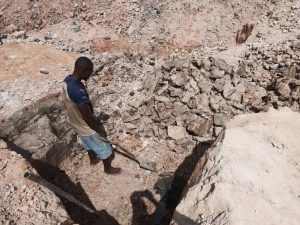
Government’s efforts to revamp Modern Ceramics Industry Umuahia
Modern Ceramics Industry, Umuahia (MOCERAM) was established in the 1960s by the defunct Government of the Eastern Region region under the late Dr Michael Okpara. MOCERAM, the Golden Guinness Breweries, plus numerous other industries that adorned the former Eastern Region under Okpara, came on board as part of the Industrial Revolution programme of that era. The factory operated optimally until the outbreak of the Nigeria civil war in 1967 which affected its operations.
The company was however, resuscitated in 1972, but unfortunately went into complete comatose in 1996 as most of the equipment became obsolete.
In an effort to revive the company, the Abia State Government handed over its management to UCL-Resources and Investments Ltd – a Special Purpose Vehicle incorporated by the Catholic Diocese of Umuahia, on May 9, 2003, under the new company name of UCL-Modern Ceramics Industry Limited (UCL-MOCERAM).
Under the new Equity shares arrangements, UCL owns 80 per cent (80%) of Modern Ceramics Ltd; Abia State Government has five per cent (5%) while the remaining 15 per cent(15%) was reserved for prospective investors.
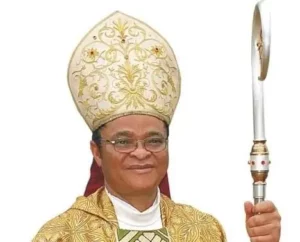
According to Business Hallmark, the then Catholic Bishop of Umuahia Diocese, Most Rev. Dr Lucius Ugorji, had at the formal handing over ceremony in 2003, hinted that an Italian Technical partner called, FUCELLI-BRUNO, was engaged for the rehabilitation of the factory. He further disclosed that the company was sourcing for the sum of N3.2 billion, at no extra cost to Abia State Government, to reactivate the factory.
The paper further reported that “in the process of sourcing for the facility, the Umuahia Catholic Diocese (major shareholder in the company), approached the Diamond Bank PLC (now Access bank) for the loan. The Diamond Bank granted the company an equipment financing loan of N2 billion. But when that loan could not purchase all the equipment needed for the re-opening of the factory; the company again sought for additional funding. Diamond Bank again, offered to help syndicate another round of financing for the company. The company signed all the required documents for the new funds to be raised.
“The required funds were raised from a consortium of lending institutions, but a bizarre twist ensued later. Diamond Bank with-held this new funds, as repayment of the principal of the initial N2 billion loan granted and insisted that interest on the loan was still outstanding.
“All entreaties by the Catholic Bishop of Umuahia to Diamond Bank to, at least, allow the company use the new funds to complete the acquisition of needed machinery and resume operations, while proceeds from the loan will be repaid; fell on deaf ears.
“The summation of it all is that as at the time of doing this report, UCL-MOCERAM is indebted to Diamond Bank to the tune of about N4.5 billion, being outstanding interest accrued on the loan obtained; in addition to the new funds raised, which was withheld by Diamond Bank.
“A caveat was also placed on the UCL-MOCERAM by the bank that any investor seeking to reactivate the factory must first off-set the outstanding indebtedness before any new work can begin.”
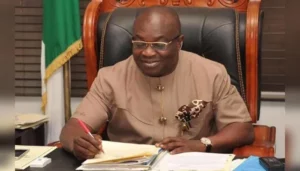
Ikengaonline gathered that efforts by former Governor Okezie Ikpeazu to open negotiations with the Management of Access Bank on how UCL-MOCERAM could be revived, did not yield fruits.
The incumbent Gov. Alex Otti, who incidentally held sway as the CEO/MD of Diamond Bank, in a recent media parley, admitted that the company is somehow jinxed. It was however, not clear if the loan was obtained when he held sway as the boss of the bank.
But in an interview with Ikengaonline, Commissioner for Trade and Investment, Dr Chimezie Ukaegbu, who was mandated by the Governor to revive all moribund companies in the state (both public and private), said the new administration was resolute about rejuvenating all moribund companies including Modern Ceramics Umuahia.
He admitted that the company had some issues but said discussions were on with the new owners on how to resolve the debacle and resurrect the once vibrant company.
“Abia Government in the past, gave out Umuahia Modern Ceramics to UCL Resources LTD during privatisation but the company went and borrowed N1.8 billion from the Diamond Bank. The bank based on what we were told, was supposed to buy equipment for the company.
“But it happened that the equipment was obsolete, so, they had problem running the place with such outdated equipment. So, we heard that the owner of Diamond Bank then, had to pay off the N1.8 billion loan. This means he now owns the majority shares in Modern Ceramics.
“We were told that the State Government then met with him, and he was willing to hand over the company back to the state with the understanding that the state would pay him back his investment.
“But under the new administration, the Governor has commissioned me to carry out investigation on moribund companies including Modern Ceramics.
So, we will engage the new owner to know what needs to be done to revamp the company for the good of all. Every option is on the table. If we have willing investors we will encourage them .”

Gov. Otti while responding to an inquiry on the efforts of his administration to revive moribund companies in the state as he had earlier promised, explained that the Catholic Church acquired Modern Ceramics but could not bring it back on stream as most of the equipment had gone obsolete, adding that great fortunes are required to truly revive the company.
“Modern Ceramics belongs to the Catholic Church. They acquired it but what they found was difficult for them to deal with. It was abandoned because so much was needed to fix it back.
“Yes my administration has an agenda to revive moribund companies in the state. But preliminary report does not support reviving Modern Ceramics in its present condition.”
Gov. Otti had also during his 2024 budget presentation before the House of Assembly, said that his administration was already discussing with owners of moribund companies in the state on how they could be resuscitated.
“The Government is already making arrangements to revive as many of our moribund industries as available resources and economic rational permit.
We are currently in discussions with those with stakes in these companies to see how we can restructure the existing agreements and have the establishments come back on stream because we are a pro-business Government, committed to actively supporting the private sector to massively create jobs for our people.”
Meanwhile, revamping Modern Ceramics Umuahia or establishing a brand new ceramic industry has become imperative in view of the huge economic gains involved. Apart from massive direct and indirect job opportunities it will create, it will also help in reducing the disturbing insecurity in the South-East as a number of youths currently engaged in the crime industry would find means of livelihood.
It is glad to note that tiles are in high demand in the state and other parts of South-East. So, siting a functional ceramics/tile producing industry in the state will be a win-win for all.
Apart from Government direct involvement, Igbo investors can pull resources to raise the needed capital to invest in the sector in view of the huge economic potentials. Abia State has huge gas deposit which can serve as source of power to any ceramic industry in the state.
This Report is part of activities by the Ikenga Media & Cultural Awareness Initiative (IMCAI) under the Collaborative Media Engagement for Development Inclusivity and Accountability Project, a multi-level intervention for media independence and government accountability, managed by the Wole Soyinka Centre for Investigative Journalism (WSCIJ) and supported by MacArthur Foundation.

